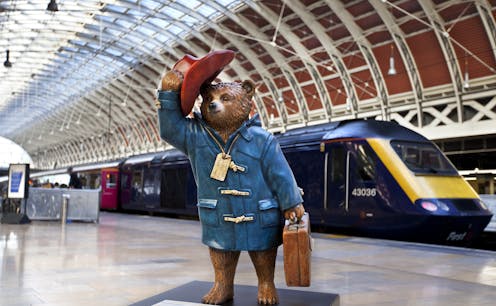
To say that Paddington Bear is a beloved British icon would be something of an understatement. The Peruvian bear, who arrived at Paddington station with nothing but his suitcase, a love of marmalade sandwiches and a luggage tag reading “please look after this bear”, was created by Michael Bond in the 1958 classic A Bear Called Paddington.
Bond went on to write 29 Paddington books, and the bear has appeared in TV adaptations for nearly 50 years. The 2014 Paddington film was launched to much acclaim, leading to a sequel in 2017. Paddington even appeared with Queen Elizabeth II during the Platinum Jubilee celebrations in 2022, cementing his status as a quintessential symbol of British identity.
In the third film, premiering November 8, Paddington will visit Peru in search of his dear Aunt Lucy. As part of the marketing campaign for the new film, the UK Home Office has granted Paddington his own British passport.
What can Paddington Bear’s citizenship journey teach our leaders?
Join The Conversation UK and migration experts in London on November 16 for a screening of Paddington in Peru and a discussion on migration, citizenship and belonging.
Click here for more information and tickets.
“We wrote to the Home Office asking if we could get a replica, and they actually issued Paddington with an official passport,” one of the film’s producers said. “You wouldn’t think the Home Office would have a sense of humour, but under official observations, they’ve listed him as Bear.”
Arriving from Peru in need of help, Paddington is often afforded the status of refugee-in-chief – even immortalised in Banksy artwork. Bond was inspired by Jewish refugees arriving in the UK from Europe during the second world war when he created the character.
In being granted British citizenship, Paddington has fared far better than most people arriving in the UK in need of help. Under the current system, asylum seekers must navigate a complex process, often over many years, in which they are disbelieved, excluded and stigmatised. A third of all people seeking asylum in the UK are refused at their initial application.
Should they manage to be granted refugee status, after five years they may apply for indefinite leave to remain. Should that be granted, after another year they may apply for citizenship status. For this to be granted, the applicant must be able to prove language skills, have passed the “life in the UK” test and be shown to be of “good character”.
Giving Paddington a passport is an unsettling display of double standards from the same Home Office that has overseen the hostile environment and other harsh asylum policies. The Home Office has made conditions in the UK as difficult as possible for people settling from overseas and has subjected people arriving in the UK to seek asylum – much like Paddington – to delays, detention, destitution and deportation.
In its treatment of the Windrush generation, the Home Office has deported people who have legally lived and worked all their lives in the UK – and has failed to compensate victims. For the Home Office then to issue a passport to a fictional character as a publicity stunt is, to put it mildly, problematic.
Read more: Through its immigration policies, the UK government decides whose families are 'legitimate'
The ‘deserving’ migrant
At the same time, the whole episode is a very clear reflection of how access to British citizenship really works. Access to British citizenship for people arriving in need of safety depends on proving yourself to be deserving of refugee status, and then of citizenship status.
Research has shown that people tend to see child refugees (like those who inspired Bond to create Paddington) as the most deserving of help. Paddington has also shown himself to integrate into the British way of life, sipping tea and eating marmalade sandwiches in a cosy duffel coat and wellies.
This supposedly deserving refugee contrasts against those seen as undeserving – most often men of colour who are seen as “invading” in “swarms”. Until recently, anyone who arrived in the UK on a boat (as Paddington did) to claim asylum would be at risk of being sent to Rwanda to have their claims processed. Keir Starmer has indicated his openness to similar offshoring deals.
The stunt also highlights how valuable a commodity British citizenship has become. While people from the Windrush generation and their descendants worked and paid taxes in the UK all their lives, only to be told that they weren’t really British, citizenship is far easier to acquire for those on investor visas, which require a £2 million investment in the UK.
The citizenship acquisition process itself is also expensive, costing upwards of £5,000 per application. While most refugees will struggle to get British citizenship, for Paddington it came relatively easily as an investment in the UK film industry.
I won’t begrudge Paddington his passport. He’s waited long enough for the security and stability of a status denied to so many non-citizens around the world. However, this stunt has highlighted both the double standards of a hostile Home Office attempting to create the illusion of benevolence, and the realities of a citizenship acquisition process which continually fails the vulnerable.
Katie Tonkiss receives funding from the Economic and Social Research Council.
This article was originally published on The Conversation. Read the original article.







